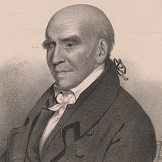
|
Sarah (Haupt) Piesch |
Sarah (Haupt) Piesch was born on Nov. 12, 1778, a daughter of John "Henry" Sebastian and Maria Catharina (Younken) Haupt/Houpt.
She was joined in wedlock with Abraham Piesch ( ? - ? ), a Swiss immigrant.
The pair did not reproduce.
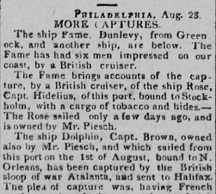 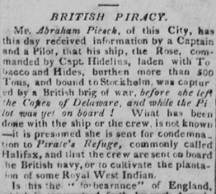 |
| Richmond, VA articles about piracy of Abraham Piesch's fleet, 1811 Courtesy Library of Congress |
They are said to have built mansion at Sixth Street and Rising Sun Lane in Franklinville. He was a well-known ship owner and East India shipping merchant in Philadelphia, said to have been in business with his wife's brothers Samuel, Jacob, Sebastian and Henry. His "counting-house" and offices were located along Water Street between Race and Vine. He also was an incorporator and board director of the Marine and Fire Insurance Company of Aurora, IL.
The History of Philadelphia by John Thomas Scharf and ?Thompson Westcott (1884) said that Abraham made his early fortune using a fast schooner named the Fly, which:
...braved the savage blacks of San Domingo in 1792-93, and in the midst of insurrection and civil war reaped the reward of his pluck and courage in a profit on coffee purchased at five cents per pound, and paid for in apples, onions, lard, and other things bought at an equally low figure. He built more vessels, large and small, than any other ship-builder of the time, and during the war of 1812-15 he had twelve schooners engaged in running the blockade. He was later engaged in the East India and European trade. Europe, Asia, China, and "Africa's sunny fountains rolled down their golden sands" on the margin of commercial enterprise, in which Girard's ships, the "Voltaire," the "Rousseau," the "Helvetius," the "Montesquieu," were the philosophic names that bore the products of republican America. Stephen Girard, Henry Pratt, Pratt & Kintzing, Willings & Francis, Smith & Ridgway, Summerl & Brown, Louis Martial Jacques Crousillat, Eyre & Massey, Blight, Montgomery, Sims, Waln, and others whose names are forgotten, were the active leaders on the wharves of the city, where their ships were loading and unloading for and from every country.
Courtesy Library of Congress
He was profiled in several books, among them these several descriptions in Philadelphia and Her Merchants by Abraham Ritter (1860):
[Page 20] Abraham Piesch, of Swiss origin, a prominent shipping merchant of the day -- a man of enterprise and risks -- thought it well to float a barge, invitingly laden, to the troubled waters of St. Domingo, and his schooner "Fly" was forthwith in command for the enterprise. Her arrival on that coast was in common with-here and there a white speck, beating to and fro, apparently upon the same errand, but to whom the fear of toil and danger was a caution, and repulsive to their schemes, for they fainted in courage, and faded in distance to fall into the arms of better security, or drop their anchors in their own roadstead. Be this as it may, our "Fly," true to her name, scented by the rich odor of the garden before her, hovered cozily on its borders until time and chance should offer their services. The massacre had been desperate and unsparing; a single white man only was reserved for their business purposes, and him they marred and mutilated in his fingers and toes, and nose too, to prevent his escape and secure his services to whatever commercial interest might turn up. He was a custom-house officer and important to their use. Whilst the "Fly" was cruising about, and her officers spying out the land and the harbor for a rescue from their anxious toil, or some medium of communication with the shore, Thomas Thuit, the decrepit survivor of his race there, was seen on his pony, pacing the sands of the shore as eagerly peering for supplies to their exhausted market. The "Fly" crept cautiously to his margin; hailing distance bounded his nasal tones; the call was encouraging, and won upon the hard salted Captain Wallace and his timid, youthful supercargo, and the yawl was manned for a parley. Assurances of safety of persons and property brought the vessel to a proper mooring, and the very desirable cargo of apples, onions, lard, and various other edibles and culinary requirements, to an available landing. To sell, was but a magical moment; and to buy, but the question of time to load. Impromptu, coffee at five cents per pound was poured like sand into the hold of the craft, until the water washed her gunwales, and compelled her crew to creep over and wade through the bean to their bunks. She was loaded in bulk. Her return was joyous to her enterprising owner, and vastly cheering to the competitors in the West India trade.
Above and below: Abraham's Philadelphia "counting house" and warehouse facing the Delaware on Water Street, between Race and Vine. Library of Congress [Page 87] The counting-house of Abraham Piesch presents itself at the upper corner of this alley [to Smith's wharf]. Mr. Piesch was one of the most enterprising shipping merchants of his day, 1800, and onwards. He built more vessels, large and small, than any of his compeers. In the war of 1812 he started twelve schooners on the stocks at the same time, to run the guantlet of blockade or pursuit. He was largely concerned in the West India trade during the revolution in St. Domingo, and in the East India and European in after time. He really was a man of mercantile prowess, withal a modest, unassuming, mild-mannered Swiss gentleman. He was shrewd and calculating, but the malignity of war and the cupidity and villainy of some of his employees, was more than shrewdness or human foresight could forefend, and he fell a victim to treachery as well as the vast odds of an open and a powerful foe: else, from $100,000 to a $150,000, would have been the balance in his favor even after his failure in 1813-14. But alas! after all his acumen in the various busy projects of mercantile life, he was shrunk by the cold embraces of poverty, and even nudged by the colder shoulders of many who had before done him reverence. But such is life!
[Page 100] The humble and unpretending Abraham Piesch was his next door neighbor [on Water Street], resident there, and occupying through to Water street, the lower story being the depot of his imports; where the hills and hollows of coffee-bags were enviable invitations to his "cubs" to play hide-and-seek, to which your humble servant was a gladsome party. As my early friend, Mr. Piesch, has gone down to the valley of oblivion, unwept and unsung by his mercantile associates, I cannot pass him here without again referring to his character and standing, as a man of wealth and prosperity to the turn of his tide, yet a man of humble bearing, of equable deportment without reference to grades, with a currency of benevolence passing him very acceptably through his various relations in life, as a very mild, soft-spoken, untempered gentleman.
 |
 |
| Above: Abraham profile in the 1860 book. Below: the Columbia Glass Works on the Delaware which Abraham managed in 1822. Google Books |
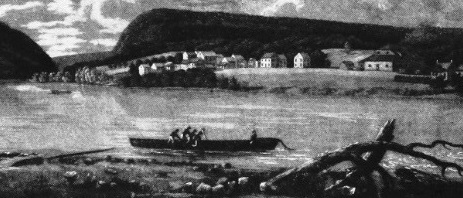 |
Abraham faced many other struggles and hurdles as he pursued his business. In 1804, he owned the 237-ton Favorite and was in an imports partnership with John William Toussat, John Dubarry, John Francis Dumas, Thomas Allibone and William Allibone (trading under the firm of Thomas Allibone and Son), Jacob Houpt, Charles Brugiere (agent for J.A. Terrascon), James Seraphim Duval and James Meade. On Sept. 15, 1804, the Favorite sailed from Bordeaux, France, heading to Philadelphia under the command of William Penrose. In the hold were stores of wine, brandy, sweet oil, cordials, artificial flowers and feathers, silks and other dry goods with a combined value of $30,000. The Favorite arrived in the port of Breakwater Harbor in Delaware on Oct. 25, 1804 but then was caught in a heavy gale of wind. The cables snapped, and the hull ran aground on a shoal known as "The Shears." According to testimony in the resulting litigation, "her situation became so perilous that the said William Penrose the master deemed it necefsary to cut away and did actually cut away the masts of the said ship by the Board. That the said ship soon after floated and was borne and carried by the tide and wind off the ground where she struck as [aforesaid] and it was then discovered that the said ship had in consequence sprung a leak, which gained so fast, after working the pumps almost four hours that there wre eleven feet and one haflf oot of water in the hold of the said ship at the expiration of the said time. Wherefore the said master was induced to leave the said ship then and there in Delaware Bay ... on the twenty-seventh day of the said month October with his crew and land on Cape May in the State of New Jersey after to wit on the same Twenty seventh day of October."
With the Favorite thus stranded and temporarily abandoned, a group of 47 local men intent on salvage boarded the vessel and began to unload. Meanwhile, back in Cape May, Favorite crewman Henry Berry obtained a light sailboat known as a "shallop" and sailed with a small crew out to the shoal, with the intent of saving the vessel and its cargo. But the band of salvors refused to allow them aboard, and forced them to turn around and depart. The wares were taken away under the legal claim of salvage to the port town of Lewistown (Lewis), DE, where they were placed in storage. With no other viable options, the ownership offered to compensate the salvors in the amount of $4,000, as though they had been paid for their labors, in return for getting back all the merchandise. The salvors counter-offered, asking for half the market value of the goods. Abraham and his partners then sued in the Special U.S. District Court for the District of Delaware, a case commencing on March 13, 1805 and heard by Judge Gunning Bedford in Wilmington. The owners then filed their legal complaint. After many court dates, that spring, summer and early autumn, Judge Bedford ordered the goods to be seized and the salvors to be cited and to appear in court. After hearing the other side of the story, the judge issued instructions that the goods be sold, with the proceeds to be divided equally between the owners and the salvors.
A typed, manuscrpt history of the family by Rev. William H. Haupt of Chariton, Iowa gave examples of even more dire hardships Abraham faced in the operation of shipping -- the spoils of war -- "During the Napoleonic wars their vessels were seized and formed part of the French spoilation claims. In 1812 the British seized the remaining 15 ships just out near Philadelphia, and this finished the operations of the company. One of the ships was the Rose, commanded by Capt. Hidelias, completed in 1811 with 20 sails and said to be "one of the best equipt and finest vessels ever built in this port," said Philadelphia's Aurora General Advertiser. Carrying 500 tons of tobacco and hides to Stockholm, Sweden, the Rose was captured by a British brig of war, while yet within the capes of Delaware in August 1811. Another vessel, the Dolphin, under Capt. Brown, en route to New Orleans, was captured by the British sloop of war Atalanta and sailed to Halifax on the charge of transporting French goods, when in fact the only such objects to be found were 25 casks of French wine. By 1830, Abraham 's business was bankrupt, and former employee Jacob Ritter and John Grenier were named as liquidators to sell off assets to raise cash with which to pay debts. They were called to the French Consulate in the city to receive some sort of official communications in the matter.
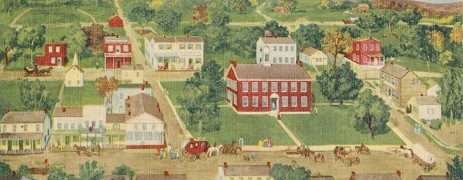 |
| Vandalia, IL, where Abraham faced legal problems and Sarah reputedly died |
He was sued in Lawrence Circuit Courtin Vandalia, IL in the April Term 1833. Vandalia at the time was the western terminus of the newly constructed National Road. A trio of complaints against Abraham were filed in chancery were brought by Samuel H. Clubb and Caius M. Eaton, Charles Emmons and Benjamin Murphy over a disputenot yet brought to light. The court ruled against him in the amount of $156.81 and attached it to his estate.
In the early 1820s, Abraham was employed as manager of the Columbia Glass Works in New Jersey, a maufacturer of window glass. With the business in financial distress, he made a statement in June 1822 in the Easton Centinel saying that the works would continue in blast during August and accept any new orders. And then when facing a sheriff's sale, he made an appeal for aid to Stephen Girard, the ultra-wealthy Philadelphia banker whom he had known in their shipowner days. The business was sold in February 1833 to new owners named Jeyberger, Lilliendahl, Vankirk and Salade. His involvement with the company is mentioned in the books American Glassware, Old and New by Edwin Atlee Barber (1900) and The Life and Times of Stephen Girard, Mariner and Merchant, by John Bach McMaster (1918)
The precise nature of Abraham's end may be lost to history. Rev. Haupt's memoir states that at long last, the "French settled their claims and as Piesch was on his way east, he was taken ill and died at Wheeling W.Va. and the papers lost." The widowed Sarah is said to have died in Vandalia,, but this is not confirmed. Their final resting places are not known.
|
Copyright © 2023-2024 Mark A. Miner |
Research for this page conducted by Della Shafer and the late Donna (Younkin) Logan |
